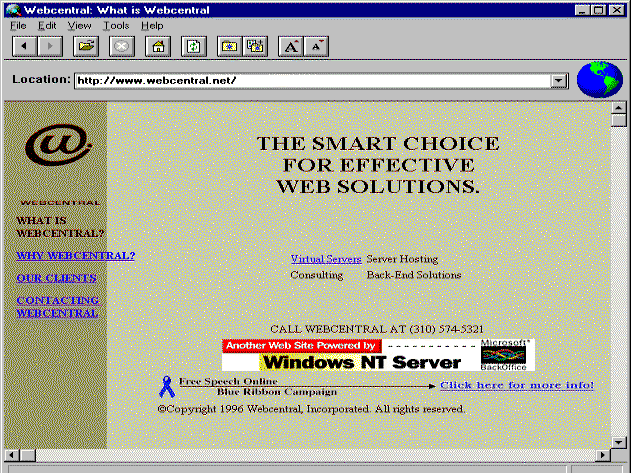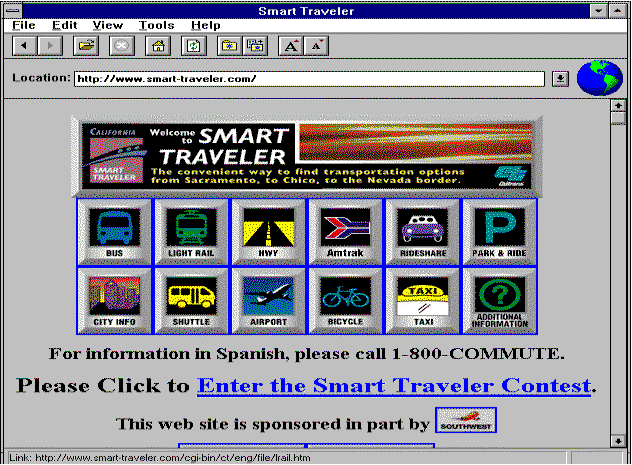
Microsoft Corporation
March 1996
Great things come in small packages for the California Department of Transportation, E-Music, and some 40 other companies that have found the perfect source for Web-site development and support in a small Southern California start-up. Known as Webcentral and founded in 1995, this start-up company runs on a concentrated supply of talent and technology in a 500-square-foot office in Marina Del Rey, just west of Los Angeles. The talent consists of a half-dozen full-time employees and a handful of individual contractors with backgrounds ranging from C++ programming to consumer-product brand management. The technology is the integrated environment of the Microsoft® Windows NT® Server network operating system and the Microsoft Internet Information Server, which Webcentral has been using as a platform for Web development since the product was in early beta testing.
As a full-service Web-site provider, Webcentral specializes in jobs ranging from HTML authoring to hosting its customers' sites on virtual servers. Webcentral is also known for its high level of personal service, for its fast, T-3 network connection, and for its technical and creative expertise. "We like to think of ourselves as much more than HTML designers," says co-founder and CEO Jonathan Ogden. "Not only do we tackle the technical side of the work but we also have an in-depth understanding of GUI design, graphic design, and the total marketing solutions our customers need."
Unlike many of its competitors, which depend heavily on Apple® Macintosh® technology, Webcentral has been a virtually 100 percent PC shop since its founding. Webcentral also has standardized its organization on Microsoft products both on the server side—with Windows NT Server and the entire Microsoft BackOffice™ family of applications—and on the desktop, with products such as the Windows® 95 operating system, Microsoft Office for Windows 95—Professional Edition, Microsoft Visual C++™ programming system, and others.

For this reason alone, the Microsoft Internet Information Server (IIS) might have seemed an obvious choice for the company's predominant Web-development platform. But for Ogden and his colleagues, obvious wasn't good enough. Instead, they spent three months evaluating the product before selecting it based on its support for standards and for its database-access capabilities, ease of importing, integration capabilities, reliability, security, and flexibility.
First among the deciding factors was the support of Internet Information Server for industry standards and, being built on the Windows NT Server operating system, its role as part of an industry standard itself. "The success of a Web application depends on standards, such as the ability to work with a variety of programming languages, a variety of data types, and a variety of vendors and know they'll all work together," Ogden says.
For example, Ogden points to the support of Internet Information Server not only for HTML and its extensions but also for Webcentral the popular Perl programming language, cgi, Visual C++, Visual Basic®, and Java. "With support for so many development environments, Internet Information Server helps us easily transfer data directly between a variety of databases and the Internet in a totally integrated environment," he reports. "This strengthens the security as well as the performance of any Web site we develop."
Ogden goes on to describe how Internet Information Server's support for standards also could enable Webcentral to develop interfaces between a customer's Web site and various I/O devices. "For example, an automobile manufacturer might be very sophisticated about the Web although its local dealers might not be," he says. "Yet it's the local dealers who need access to the information generated by the manufacturer's Web site—what features customers visiting the site are most interested in, that sort of thing. So when it came time to develop a Web-site solution for the automobile manufacturer, we might design it to deliver such information to a dealer's fax machine so the dealer could be ready when the customer made a visit. Because of its support for standards, Internet Information Server would enable us to design exactly such a solution."
Another advantage of using a standard environment is the availability of off-the-shelf applications. "This means that we can purchase components for our solutions instead of having to build everything from scratch—saving time, effort, and a lot of headaches," says lead programmer John Little.
ODBC support is another example of the product's adherence to standards. As Little explains, the need for ODBC made one Webcentral project the perfect test case for Internet Information Server. That project, which involved porting a NetScape™/UNIX®-based Web application to Internet Information Server, was for Executive Suites Online, a joint venture between Webcentral and Office Telecom Marketing, an Irvine-based telecommunications service provider. Today, visitors to the Executive Suites Online Web site can access information covering up to 2,000 available office locations nationwide, information that's stored in a Microsoft SQL Server™–based database. "For this kind of application, the native, tightly integrated ODBC capability of Internet Information Server comes in extremely handy," Little says. "With it, we can develop databases for such an application on a standard platform like Microsoft SQL Server."
ODBC also means the customer can provide original data or updates in a variety of standard formats. As Little points out, Webcentral initially designed the Executive Suites Online application in Microsoft Access and later ported it to Microsoft SQL Server without having to change one line of the original Microsoft Access code. "In turn, the customer could do likewise: develop the database in a product they're used to—such as Microsoft Access, ORACLE, Microsoft FoxPro®, and so on—and we could just hook it to our Microsoft SQL Server database and be done," he says.
Another advantage of the tightly integrated ODBC capability of Internet Information Server helps simplify remote updating. "With this capability, we've developed an interface so that field personnel can perform updates remotely," Little says. "This also enables our salespeople to let customers 'test drive' a sample site or, post-sale, work closely with their local sales representative to keep their site up-to-date."
To meet similar ODBC needs, Webcentral is using Internet Information Server as a platform for a multicity restaurant-listing service provided by a Southern California outfit called Eatz. The firm also is porting two Netscape-based sites to Internet Information Server: One for E-Music and another for the Internet version of Websight magazine.
According to Little, porting to an non-Internet Information Server is a relatively easy job. That's lucky for Webcentral, because the company originally developed a couple dozen of its customer sites for a Netscape/UNIX platform. "With the support in Internet Information Server for the CGI—common gateway interface—we've found we can port 90 percent of our NetScape/UNIX code to Internet Information Server with our eyes closed," he says. "This means we can easily take advantage of existing Web investments, as can our customers and the three million other organizations that already have developed Web sites for other platforms."
Porting into Internet Information Server is also easy for those customers whose Web sites depend on scripts written in Perl, the most common language for developing CGI routines. "We found that installing Perl on Windows NT Server took us about one-tenth the time it did installing it on UNIX," Ogden says.
In addition, the Internet Server applications programming interface (ISAPI) provides a number of other benefits for Webcentral and its customers. "With its multithreaded architecture, ISAPI helps us optimize performance by avoiding expensive process creation," Little points out. "Also, because ISAPI is based on the Microsoft Dynamic Link Libraries (DLLs), it can enable us to easily extend thousands of Win32® API–based solutions for use on the Internet. This gives us and our customers alike access to an enormous pool of programming and other development resources."

Integration with the existing development infrastructure at Webcentral provides another advantage for developers there. "Because it's built on the Windows NT Server, of course, Internet Information Server is cleanly integrated with our existing BackOffice, building the databases we're running on the desktop," Ogden notes. "This means we can use software we're all familiar with—and in a completely integrated fashion—for faster development, for more efficient project management, for a better-performing solution, and for a higher level of customer support."
Security is another advantage of the close connection between Internet Information Server with Windows NT Server, as Ogden points out in describing Webcentral's work for Websight. "Using the Internet Information Server Secure Sockets Layer (SSL), we've created a security system for the Websight site that's easier to administer than the UNIX-based system they were using before," he explains. "At the same time, since SSL runs on Windows NT Server, Websight administrators can easily access the site's secure directories. So they can enjoy both security and accessibility, advantages that on other systems can sometimes be at odds."
Reliability is almost as crucial as security in the Web environment, and that, too, says Ogden, is a benefit of the fact that Internet Information Server is built on the Windows NT Server environment. First, there's the comprehensive disk-backup system of Windows NT Server. "For the average Web site, the Windows NT Server backup methods such as disk mirroring, drive duplexing, and RAID 5 are automatic and transparent and provide exactly the reliability that's needed."
Then there's the benefit of just knowing what's going on, as Ogden puts it. "This comes from the ease of administration provided to Internet Information Server by Windows NT Server," Ogden says. "Errors, for example, are documented to standard logs and applications are available to help make error information immediately available to support staff."
Ease of administration also means that Webcentral and its customers are able to find plenty of people who are able to do the job. "If you need an administrator for a Web site, it's much easier to find someone who's familiar with the Windows NT Server user interface—which is, essentially, the Windows 3.1 user interface—than, say, a particular flavor of UNIX," Ogden says.
The scalability of Internet Information Server provides customers important benefits as well. "With a scalable platform like the Microsoft Internet Information Server, a company can open a Web site on a small server platform with minimal memory and a small hard drive, and as the Web site becomes more widely used, migrate it all the way up to gigabytes of RAM and terabytes of data storage," Ogden explains. "This means our customers don't have to buy a lot of elaborate hardware in the beginning, nor do they have to invest in costly code rewrites when it finally is time for more powerful hardware."
At Webcentral, Web-site development is a service not only for external customers but for internal ones as well—Webcentral employees. Webcentral uses the Internet Information Server as a platform for its own Web site: http://www.webcentral.net/, which runs both on the Internet and on the company's internal intranet. With its Web site, Webcentral employees and independent contractors can perform such activities as sky-paging colleagues directly from the desktop, participating in forums for discussion of corporate strategy, and supporting customers.
"The idea is to keep our core team and our contractors in touch with one another on a group level, an individual level, and a subject level, with the end goal of a more integrated working unit, higher-quality results, and a shorter time to market," Ogden says. "We've worked hard to cultivate the talent, and with Internet Information Server we have the technology, so it's a goal we're confident of reaching."